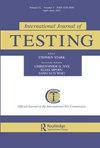The (Non)Impact of Differential Test Taker Engagement on Aggregated Scores
IF 1.4
Q2 SOCIAL SCIENCES, INTERDISCIPLINARY
引用次数: 26
Abstract
Disengaged test taking tends to be most prevalent with low-stakes tests. This has led to questions about the validity of aggregated scores from large-scale international assessments such as PISA and TIMSS, as previous research has found a meaningful correlation between the mean engagement and mean performance of countries. The current study, using data from the computer-based version of the PISA-Based Test for Schools, examined the distortive effects of differential engagement on aggregated school-level scores. The results showed that, although there was considerable differential engagement among schools, the school means were highly stable due to two factors. First, any distortive effects of disengagement in a school were diluted by a high proportion of the students exhibiting no non-effortful behavior. Second, and most interestingly, disengagement produced both positive and negative distortion of individual student scores, which tended to cancel out much of the net distortive effect on the school’s mean.不同考生参与对总分的(非)影响
在低风险的考试中,心不在焉的考试往往最为普遍。这导致了对大规模国际评估(如PISA和TIMSS)汇总分数有效性的质疑,因为之前的研究发现,国家的平均参与度和平均表现之间存在有意义的相关性。目前的研究使用了基于pisa的学校测试(Test for Schools)的计算机版数据,研究了不同参与程度对学校总体成绩的扭曲效应。结果表明,虽然学校之间的参与程度存在较大差异,但由于两个因素,学校的投入程度高度稳定。首先,在学校里,没有表现出不努力行为的学生所占比例很高,这就稀释了任何不投入的扭曲效应。其次,也是最有趣的一点是,不投入对个别学生的成绩产生了积极和消极的扭曲,这往往会抵消对学校平均分的大部分净扭曲效应。
本文章由计算机程序翻译,如有差异,请以英文原文为准。
求助全文
约1分钟内获得全文
求助全文
来源期刊

International Journal of Testing
SOCIAL SCIENCES, INTERDISCIPLINARY-
CiteScore
3.60
自引率
11.80%
发文量
13
 求助内容:
求助内容: 应助结果提醒方式:
应助结果提醒方式:


